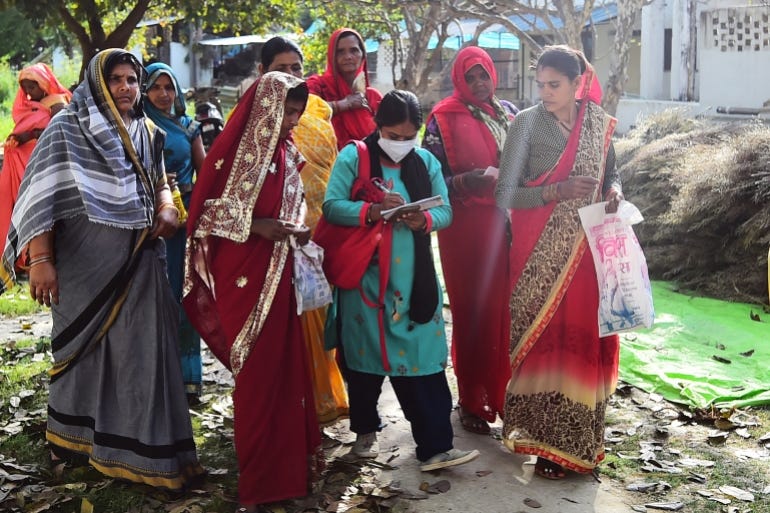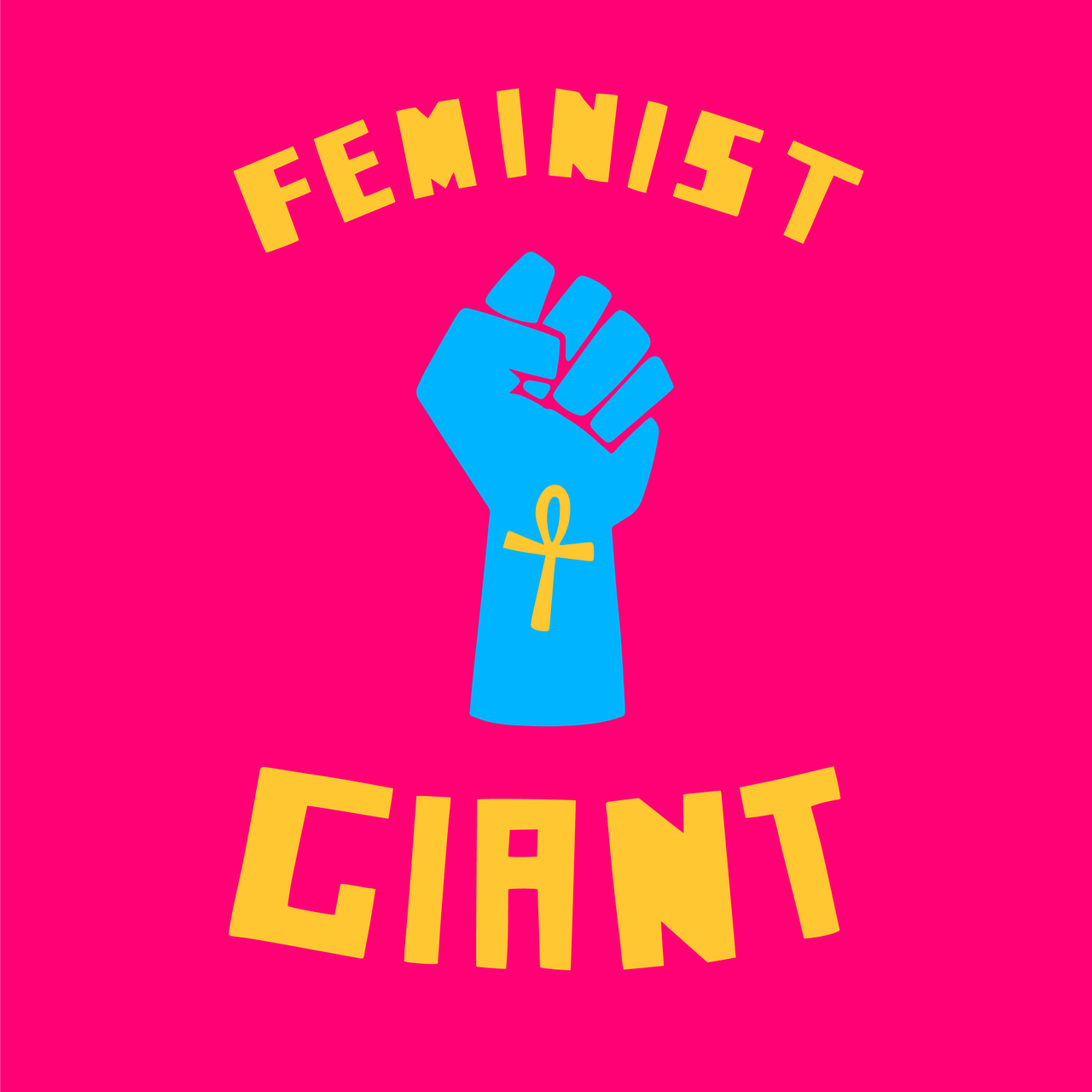Global Roundup: Oscar-nomination for Documentary on Marginalized Women Journalists in India, Rare LGBTQ Victory in Poland, Theatre Show on Residential Schools
Curated by FG intern Lydia Georgison
Meera Devi, centre, managing editor and reporter of Khabar Lahariya, speaks to women while reporting in Banda district, Uttar Pradesh [Sanjay Kanojia/AFP] via Al Jazeera
The journalists of Khabar Lahariya have built a massive following across Uttar Pradesh, a northern state with more people than Brazil, covering a beat that runs from thefts to sexual violence and corruption.
They have earned the respect of their village communities by covering local stories often overlooked by India’s established media outlets, but only after a relentless battle to be taken seriously by authorities and even their own families.
Just stepping outside the household was a big challenge … I had to fight many battles. Even my father was dead against me. He said, ‘You can’t do this work; this is not something that women are supposed to do.'- reporter Geeta Devi
As with some of her colleagues, Devi is a member of the Dalit community, the lowest rung in India’s rigid caste system and victim of an entrenched culture of prejudice and humiliation for centuries.
Formal discrimination against Dalits was abolished a long time ago. However, they are still often barred from entering temples or houses belonging to privileged castes and remain targets of discrimination and violence.
In Banda, a riverside town a few hours’ drive from Taj Mahal, Devi interviewed a woman rendered destitute after being abandoned by her husband. But as word got around that a Khabar Lahariya reporter was nearby, others approached her to implore coverage of their woes municipal neglect leading to a lack of clean drinking water and dirty, overflowing drains.
Some women spoke privately to share their stories of sexual harassment and violence. As members of a marginalized community and women in the deeply patriarchal villages of India’s Hindi-speaking heartland, Khabar Lahariya’s correspondents have a unique insight into local affairs, and Devi says she is proud to be part of a team working with a “feminist lens.”
Their endeavours are the subject of Writing with Fire. This Oscar-nominated documentary has taken the film festival circuit by storm and has already won the Special Jury Award at Sundance.
India is home to the world’s most prolific film industry, and cinema holds a rarefied place in national culture, with stars enjoying the almost divine status and people often queueing to watch the same movie multiple times.
But no Indian-produced film or documentary has ever won an Academy Award, despite locally shot foreign productions Gandhi and Slumdog Millionaire winning Best Picture in years past.
Meera Devi, the outlet’s managing editor, says her work is driven by a passion for giving a voice to those left out of India’s success story.
When I fight for the rights of the minorities, tribals and other marginalised sections of society – when these people get heard and get justice, I feel very good. – Meera Devi
Born in a remote village and married at 14, Meera had to fight against the odds to get a college degree. At 35, Meera joined the media house, soon after it began publishing, initially on stories of cattle theft and tragic family before moving on to local politics.
Her work has sent crooks to jail and shamed officials into ordering the repair of rundown roads and charting the rising tide of Hindu nationalism in the country’s rural hinterlands.
The men here are not used to seeing powerful women, especially in a field like journalism. But we are changing that outlook. We have proved that if women are given the right opportunities, we can achieve anything. Once you give women the freedom they deserve, you simply cannot stop them. – Meera Devi
Credit: Unsplash; Elham Numan/Xtra
Four activists have managed to pull off a surprising legal triumph in the face of increasing government persecution of LGBTQ+ people in Poland.
In December 2021, a group called Atlas of Hate, a research organization that tracks the actions of anti-LGBTQ+ governments across Poland, won a court case against the local government of Przasynysz, a town of about 20,000 people located north of Warsaw. The civil suit was heard at a district court of the Masovian voivodeship.
The presiding judge, Grazyna Szymanska-Pasek, said in her decision that Atlas of Hate exercised its constitutional freedom of speech and freedom of expression, as granted by Article 10 of the European Convention on Human Rights, and was guided by the public interest in its project of informing the public about anti-LGBTQ+ government policies. Szymanska-Pasek agreed with the activists’ arguments regarding the law and the organization’s definition of family as not being simply a heterosexual institution.
The family is not just a father, mother and children. It is also, for example, a mother raising a child with her partner or a father raising a child with his partner. - Grazyna Szymanska-Pasek
The court case was sparked after a 2019 decision by the Przasnyski County Council to adopt what’s called the Local Government Charter of Family Rights. The charter, sponsored by the influential and conservative Roman Catholic group Ordo Iuris, had the town commit to the “protection of marriage, being a union of a man and a woman, as well as the family, motherhood and parenthood, the right to protect family life, the parents’ right to rear their children in accordance with their own convictions, and the child’s right to be protected against demoralization.” Przasnyski’s adoption of the resolution, which has been passed by dozens of governments in Poland, did not go unnoticed. Atlas of Hate has been collecting documents about local anti-LGBTQ+ resolutions, some of which are used to deny all forms of aid or funding to LGBTQ+ people, ban the participation of LGBTQ+ organziations in local political life and prevent anti-discrimination education in schools.
Some resolutions have declared jurisdictions to be “LGBT ideology-free zones” meant to signal broadly that LGBTQ+ people are unwelcome and prevent queer and trans events. The atlas activists compile these jurisdictions into an online spreadsheet and publish it for every voivodeship in Poland to draw attention to these policies.
But when Atlas tagged Przasnyski on their map, the county council accused them of violating their good name, defending the adoption of the Charter in support of “normal values, in favour of the family.”
The county filed a civil court case on Jan. 20, 2021, and six months later, on July 20, the first hearing was held.
When the court dismissed the lawsuit on December 29, 2021, it also ordered the county to pay Atlas’ court costs, about 1,000 euros.
The struggle of the four activists is not over yet. Przasnyski’s resolution is still in effect, and the county has already announced an appeal so that an appeals court will process the case.
The victory is a very good signal for us. It shows that even a small informal activist group can win against a law foundation with a multi-million dollar budget that co-operates closely with an authoritarian state. - Jakub Gawron, a founder of Atlas of Hate
The LGBTQ+ community in Poland has faced increasing discrimination as the country’s ruling party, the right-wing and Roman Catholic-oriented Law and Justice party, continues to implement anti-queer and trans policies. This part of the anti-LGBTQ+ narrative began during the 2019 parliamentary election campaign when ultra-conservative politicians adopted a strategy of using LGBTQ+ issues as a scapegoat to divert attention from more critical issues.
Nikko Hunt (centre) plays the lead role in the 2022 production of ‘New Blood’. (Submitted by Lauren Hamm) via CBC
New Blood is a theatre show that uses movement and dance to tell the story of an Indigenous girl forced into a residential school. Students from Rosebud School of the Arts have perfected their performance for weeks. Audiences are drawn to the small Alberta hamlet for a product that promises more than simple entertainment.
The play is performed at the Rosebud Opera House, and scenes draw mainly from personal experiences. Some of the Blackfoot cast members are playing with their parents or grandparents.
Eulalia Running Rabbit’s daughter is in the play. Running Rabbit says she was bussed to and from a residential school every day. She recalls a friend who would wait for her to get off the bus before they ran upstairs to look through the school’s windows.
One day, I asked her, what is it you look out to? Because there's nothing. And she said, 'No, I come here every morning because I'm wishing that my parents are coming for me. - Running Rabbit
Windows feature as central props in the performance, an ode to Running Rabbit’s childhood friend whom she says, by comparison, made her feel lucky.
That kind of hit hard to know that she never gets to go home for the year. I thought I was very fortunate coming from my home and knowing that I'll be going back home to my parents. – Running Rabbit
Running Rabbit started working with director Deanne Bertsch on ‘New Blood’ about eight years ago. Bertsch says the concept for the play was inspired by a family trip to the pictographs at Writing-on-Stone Provincial Park.
That’s where she says she learned about the erasure of Blackfoot culture and history.
I just was really saddened and horrified, and moved to go and do something back at the school I teach at, which is Strathmore High. So my dance class at the time, combined with Eulalia Running Rabbit, who's in the show with her Blackfoot class, we collaborated and came up with New Blood. – Deanne Bertsch
The student performers hope that the production can give audiences a new perspective on the residential school experience. Nikko Hunt has a lead role in the performance.
I'm half Blackfoot and half white, so I have kind of both worlds and kind of sometimes it feels like they don't really match at all. But with 'New Blood' I've been able to see, like the Blackfoot world and the non-Indigenous world kind of collide. -Hunt
Kenzie Baker is a dancer in the production. She says it’s essential to recognize that residential schools are part of a very recent past.
I learned about residential schools through school, and I've been to museums and seen stuff like that. But this is the first time I've kind of been able to speak with people who've been impacted on a personal level. - Kenzie Baker
Bertsch admits she was initially intimidated by the community, including Running Rabbit.
She talked about healing and that was my most important goal, is that the show could somehow help heal all of us and bring us towards some kind of reconciliation. - Kenzie Baker
While this performance run is for one weekend only, running March 18-20, ‘New Blood’ is a travelling production. Anyone who wants to bring the show to their community can contact the production team to schedule a performance.
Lydia Georgison (she/her) is a first-year student at the University of Ottawa. She is passionate about becoming a feminist by learning and broadening her knowledge of topics that have to do with feminism. She spends most of her time studying in the field of criminology.
Lydia strongly believes the key to excellence within society is listening and learning from everyone’s opinions. She suggests that the key to a peaceful and accepting community is the result of educating ourselves on controversial topics.





